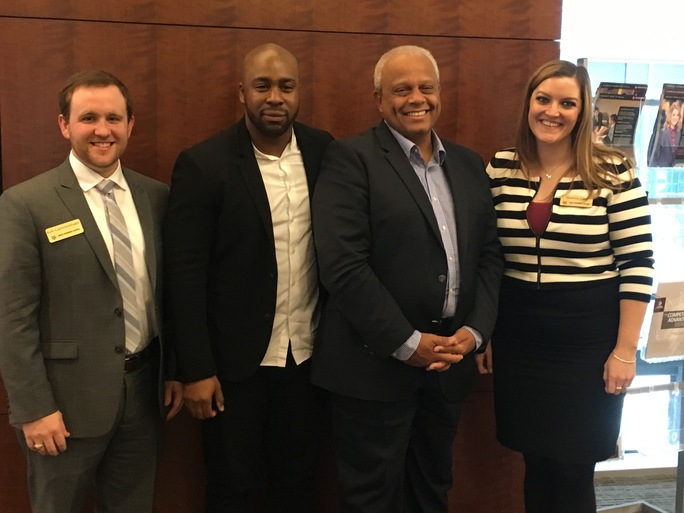Need for corporate citizenship escalating, says Lord Hastings
May 11, 2016
|
Mays Business School

Lord Hastings, second from the right, visited the Mays CityCentre campus.
Purpose-driven businesses and employees who commit to doing more than an occasional project will be key to ensuring sustainability, Lord Michael Hastings urged a group at Mays Business School’s CityCentre campus in Houston.
The invitation was extended to Hastings through a developing partnership between Mays and Josh Dickson, vice president of regional engagement for Teach for America.
“Through our conversations, Josh realized Lord Hastings would be a perfect fit to discuss how corporations can leverage their impact in the world,” said Kyle Gammenthaler, who is teaching a Strategic Philanthropy class at Mays. “From there, KPMG leadership helped facilitate the coordination of the schedules and materials, so we were able to hear from one of the leading experts on global citizenship.”
Hastings, a former teacher who has done extensive work with children in need, was awarded a Commander of the Order of the British Empire in 2002 in recognition of his services to crime reduction. He is listed as one of the 100 most influential black people in Britain and is No. 6 on the 2016 list of 100 black British business leaders. He represents KPMG International on the Global Corporate Citizenship Committee of the World Economic Forum and is a board member of the Global Reporting Initiative.
Hastings spelled out the grim picture of the future:
- About 1 billion people will live in areas of water stress by 2030 in a “business-as-usual scenario”
- The world’s population of people 65 and older will double by 2030, to about 1 billion
- 90 percent of the youth population globally will live in undeveloped countries
- 1 million young people in India will enter the workforce every month for the next 20 years.
The good news, he said, is that an increasing number of businesses are implementing goals of improving the lives of others. Unilever, for example, defines its purpose “to ensure 1 billion people get access to water and food.” “We’ve got to look at where the pressures are, and to change necessitates investment of ideas,” he said. “If we’re honest about the world’s sharable resources, population isn’t an issue. Allocation is, and overpopulation in some places.”
After the seminar, Hastings and his son Paul Payne, a business manager in London, met with a smaller group for a roundtable discussion. Payne said before any real progress can occur, the business world must change how it operates. For instance, companies should integrate corporate responsibility into their daily operations rather than allocating a percentage of the profit toward it afterward. “I think until we allow ourselves to do good without the recognition, we won’t make a dent on it,” he said.
“I think young people, as emerging leaders, should systematically change how business is done,” he said.
Payne encouraged collaborations across business sectors and between industries, because he said no single organization can make a dent. “Until we allow ourselves to do good without wanting to take any credit, I think there’s only so far we can get in this journey of trying to see sustainable change.”



